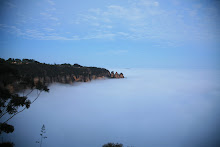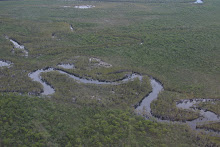
By Damian Baker
Img: West Papuans arriving. Credit: Damian Baker
On January 18, 43 West Papuans stepped onto Australian soil at Mapoon on the west coast of Cape York Peninsula. Amazingly, they had traversed 425 kilometres at sea in a 25-metre traditional dugout canoe fitted with an outboard motor. They were flying the West Papuan flag, outlawed by the Indonesian government.
Early on January 13, Australia-West Papua Association convener Louise Byrne was rung and informed from Merauke, West Papua, that a boat-load of independence activists was leaving for Australia. “These are undoubtedly political activists”, Byrne told the January 18 Melbourne Age. “Their concern seems to be to preserve their activism. The Indonesian authorities have been extraordinarily effective in getting rid of people advocating independence for many years.”
According to Byrne, the asylum seekers include student leaders from all over West Papua's lowlands and highlands. Herman Wainggai, one student leader aboard the boat, was imprisoned for treason last year in the provincial capital of Jayapura, having previously spent long periods in jail for his activities. Wainggai comes from a political family; his father died in Cipinang Prison in Jakarta, where he had been imprisoned alongside leader of the East Timorese resistance Xanana Gusmao.
Byrne said the West Papuans were forced to undertake the journey by boat because the usual means of escaping — crossing the border into Papua New Guinea — had become increasingly difficult. “Although it hasn't been announced, I think the Indonesian government has changed its policy and is now realising that ... autonomy isn't working and I think they're about to implement a military solution.”
The journey by the 30 men, six women and seven children was expected to take just 15 hours. The alarm was raised by AWPA on January 18 when the boat was three day's overdue. By the end of that day, the boat had been found.
The asylum seekers had hung a huge banner which read: “Save West Papua people soul from genocide intimidation and terrorist from military government of Indonesian. Also we West Papuan need freedom peace love and justice in our home land.’‘ But if not for photographer Damien Baker and the Cairns Post, which hired a helicopter, we might never have seen the boat and its political message.
On January 19, Baker, a journalist from Torres News on Thursday Island, hired a helicopter and flew through the “no-fly exclusion zone” set up by the police around the West Papuan refugees. He found the Papuans huddled under a tree, but was prevented from talking to them by police.
By Damian Baker
Australia immigration authorities ruled on Friday that the West Papuan asylum seekers who arrived on Cape York on January 18 to be potential refugees.
This ruling is a first step towards granting them refugee status. They will have to be formally interviewed and their claims processed, before a final decision from Australian authorities can be made. This decision is not expected for some time but it has given refugee advocates hope. The group is believed to have been identified as genuine high-profile, non-violent political activists, and several also offered credible claims of torture and imprisonment. Among the group are unaccompanied children of Papuan activists unable to flee.
The move towards granting asylum to the West Papuans has put further strain on Australia’s relations with Indonesia. Jakarta are worried that the growing strength and increasing prominence of the West Papua independence movement might result in more defections and further political instability.
The Indonesian Government has made clear its disapproval of the moves to grant refugee status through its Ambassador to Canberra Hamzah Thayeb. He told ABC Radio “relations between Australia and Indonesia would certainly be affected if Australia grants refugee status to the asylum seekers.”
Earlier last week Australian Immigration officials allowed the 43 West Papuan asylum seekers detained on Christmas Island their first contact with legal and social representatives since arriving in Australia on Cape York two weeks ago.
A joint delegation of Legal representatives from both the Australian Government and the asylum seekers, and a cross party parliamentarian committee have visited Christmas Island. Immigration officials are currently processing the asylum-seekers on Christmas Island.
Department of Immigration officials have also allowed media and representatives from the Australia West Papua Association (A.W.P.A.) access to the West Papuans.
Nick Chesterfield, A.W.P.A. spokesman ,said: “Access has been allowed by telephone very briefly to us,” when he spoke via phone to the Torres News.
Mr Chesterfield said A.W.P.A. and other Australian refugee groups are encouraged by the developments adding that “pressure still needs to be applied so a fair outcome is achieved.”
On the diplomatic front Indonesia President Susilo Bambang Yudhoyono has urged Prime Minister John Howard to return the West Papuans, saying they had no case for asylum. He assured Mr Howard they would not be persecuted.
However Herman Wainggai, the leader of the 43 asylum seekers, said from Christmas Island: “It’s the same as with East Timor. They have created militias and jihadis in West Papua. The people, and especially activists for independence, are very scared.
“The military and police regularly raided campuses and villages searching for independence sympathisers, while Indonesia’s intelligence network kept constant tabs on their activities” Mr Wainggai said.
“We don’t trust Indonesia. f I was sent back to Indonesia, I would die. The Government and the military treats West Papuans like animals. They have killed us like animals.”
Melbourne-based A.W.P.A spokesman Jacob Rumbiak has been in contact with Herman Wainggai by telephone. Mr Rumbiak himself spent many years in Indonesian prisons for his belief in West Papuan independence.
He told the Torres News: “The West Papuans were in good spirits, but fearful of the chance that they may be sent home.”
Mr Wainggai told Mr Rumbiak that he had had approaches from Canberra to ask if an Indonesian delegation can interview the detainees held on Christmas Island. The West Papuans talked over the issue and have all signed an agreement to reject any approaches from Indonesia at this stage.
”They simply want to go through Australian Government channels and move forward in their claims for asylum,” said Mr Rumbiak, who has plans to travel to visit the detainees.
He will stop over in Perth after a 12-year-old West Papuan boy in a Perth hospital asked Mr Rumbiak to visit him. The boy is in the hospital with two other West Papuans for treatment.
“He is scared and homesick and fears that he will be separated from the other members of the group,” said Mr Rumbiak. “I told him he is Ok now he is in Australia and the officials are not like the Indonesians.”
An A.W.P.A. member has visited the young boy in hospital taking him sago - a traditional Papuan food to help him feel more at home.
The fear of officialdom shown by the detainees is a result of the way they have been treated in West Papua by the Indonesian military, says Mr Rumbiak. “They have used the same tactics of terror in West Papua that were they employed in East Timor.”
Mr Rumbiak is aware of West Papuan children from the highland region of Waminam as young as 10 being recruited by the Indonesians to be educated in a Pesanteren in the Bandung Hills above Jakarta.
The Pesanteren are religious boarding schools that have in the past been suggested to have links to Jihadist Islamic groups. Indoctrination such as this is not unusual, according to Mr Rumbiak.
A young 26-year-old West Papuan who has been educated in this way was recently sent to Iran as part of an Indonesian delegation to talk on West Papua.
Mr Chesterfield said it is not unusual for family members of independence advocates in West Papua to be approached by the Indonesians. He said some are dealt with violently and others are targeted to be dealt with in a friendly manner, they are offered free education, and then taken away to be indoctrinated in schools in the Bandung Hills.
Immigration Minister Amanda Vanstone has said Indonesian demands for the asylum seekers to be handed back would not stop or influence their processing, commenting their cases would be dealt with




.jpg)

.jpg)
No comments:
Post a Comment